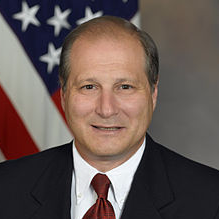Watch Webinar – Use It or Lose It: The Last Chance for Snapback Sanctions on Iran
Click here to read a transcript.
On August 28, the UK, France, and Germany formally invoked the “snapback” mechanism to reinstate UN sanctions against Iran, a move they had been warning of unless Tehran restored International Atomic Energy Agency monitoring, accounted for its near-weapons-grade uranium stockpile, and resumed nuclear negotiations with the Trump administration. The snapback mechanism was set to expire on October 18. However, as JINSA has pointed out, the whole process could take up to six weeks, meaning that the looming de facto August 31 deadline was really a use it or lose it moment.
Moscow had been working on behalf of Tehran to defuse this possibility, including by pushing a UN resolution to extend the snapback’s expiration or otherwise block its near-term use. Those efforts failed to forestall European action.
To discuss the implications of UN sanctions snapback and whether it can effectively counter Iran’s nuclear program, JINSA hosted a webinar featuring JINSA Distinguished Fellow and Iran Policy Project co-chairman Amb. Eric Edelman, JINSA Senior Advisor and former Assistant Secretary of State for International Security and Nonproliferation the Hon. Stephen Rademaker, and JINSA’s Director of Foreign Policy Jonathan Ruhe.

Amb. Eric Edelman Amb. Eric Edelman is a Distinguished Scholar at JINSA’s Gemunder Center for Defense & Strategy and the Co-Chair of its Iran Policy Project and Eastern Mediterranean Policy Project. Amb. Edelman served in senior positions at the Departments of State and Defense as well as the White House where he led organizations providing analysis, strategy, policy development, security services, trade advocacy, public outreach, citizen services, and congressional relations. |

The Hon. Stephen Rademaker The Hon. Stephen Rademaker has over 20 years’ experience working on national security issues in multiple branches of government. As Assistant Secretary of State for International Security and Nonproliferation, he led multiple bureaus at the State Department, and also directed the Proliferation Security Initiative and nonproliferation policy toward Iran and North Korea. During this time he also headed U.S. delegations to the 2005 Review Conference of Nuclear Non-Proliferation Treaty (NPT). |

Jonathan Ruhe Jonathan Ruhe is the Director of Foreign Policy at JINSA. Prior to joining JINSA, he worked at the Bipartisan Policy Center (BPC), where he focused on Middle East and Former Soviet Union security issues. His commentary has appeared in the Wall Street Journal, Washington Post, Foreign Policy, The Dispatch, and various international media outlets. |

Blaise Misztal Blaise Misztal is the Vice President for Policy at JINSA. His research interests include Iran and its nuclear program, U.S.-Turkey relations, countering extremism, and strategic competition. Misztal previously served as the Executive Director of the Task Force on Extremism in Fragile States, a congressionally mandated project convened by the U.S. Institute of Peace, and Director of the Bipartisan Policy Center’s National Security Program. |